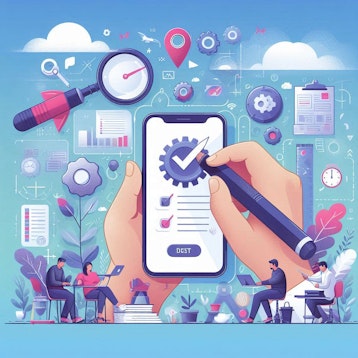What if the future of business operations, defined by seamless efficiency and innovation, is already within our grasp thanks to Artificial Intelligence (AI)?
This vision, where AI transforms demand forecasting, inventory management, and customer experience personalization from cumbersome tasks into streamlined processes, is not a distant dream but today's reality. AI, extending beyond the confines of Silicon Valley tech giants to businesses of all scales, employs technologies like machine learning and robotic process automation (RPA) to not just automate tasks but reveal insights previously obscured in data.
This paradigm shift in business operations, powered by AI, not only enhances efficiency and decision-making but also unveils new opportunities and customizes interactions, ushering in a new era of creativity and strategic growth. Explore the transformative power of AI in business, as it propels operations beyond traditional limits to a future brimming with potential.
Understanding AI's Role in Business Operations
Artificial Intelligence in Business
At its core, Artificial Intelligence refers to a suite of technologies capable of performing tasks that traditionally require human intelligence. Examples include machine learning, where algorithms use data analysis for prediction or decision-making purposes; and robotic process automation (RPA), where software robots automate repetitive tasks.
But why are AI technologies essential to business operations? Their primary benefit lies in improving efficiency while simultaneously decreasing errors and creating growth opportunities; for instance, implementing UX design review practices using AI could significantly enhance customer interactions by making customer interactions more personal while opening new avenues of growth potential - for instance, adopting UX design review practices could help make customer interactions more personalized and responsive compared with traditional approaches requiring human intelligence alone.
AI's Impact on Business Efficiency and Decision Making
Artificial Intelligence (AI) is revolutionizing business efficiency and decision-making, far beyond mere automation. Its integration into various sectors, notably fintech, showcases AI's capability to customize services to individual needs, predict market trends, and streamline operations. This dynamic technology not only enhances operational efficiency but also offers strategic insights for business expansion.
The advent of AI in business operations marks a significant shift towards data-driven decision-making and personalized customer experiences. By leveraging predictive analytics, companies can now anticipate market demands, optimize inventory, and tailor offerings to individual preferences, thereby achieving a competitive edge.
Key Points:
Predictive Analytics for Strategic Planning: AI’s ability to analyze vast datasets enables businesses to forecast demand accurately, leading to optimized inventory levels and resource allocation. This strategic planning tool like the ones discussed in this previous article aids in minimizing waste and ensuring that businesses are well-prepared to meet their customers' needs, thereby enhancing overall efficiency.
Personalization of Customer Experiences: Through AI, companies can create personalized customer profiles, leading to higher satisfaction and loyalty. AI analyzes customer data to tailor services and products to individual preferences, significantly improving the customer journey and fostering loyalty.
Fintech Innovations through AI: Fintech companies utilize AI to offer tailored financial advice and services, paving the way for personalized banking experiences. By understanding individual financial behaviours, AI enables startups and fintech firms to offer customized advice, predict financial needs, and provide bespoke solutions, thus enhancing customer engagement and satisfaction.
Operational Streamlining: AI automates routine tasks, allowing businesses to focus on strategic growth areas. By automating time-consuming tasks, AI frees up human resources for more complex, value-adding activities, thereby improving operational efficiency and productivity.
Market Trend Analysis and Expansion: AI tools predict market trends, helping businesses to adapt and find new expansion avenues. AI’s predictive capabilities allow businesses to stay ahead of market trends, identify new opportunities, and strategically plan for expansion, ensuring long-term growth and sustainability.
With AI at the helm, businesses are not just automating processes but are also making informed strategic decisions, personalizing customer interactions, and opening new pathways for growth and innovation. Moving forward, we will delve into specific AI technologies, their applications, and real-world examples that highlight AI's transformative impact on the modern business landscape.
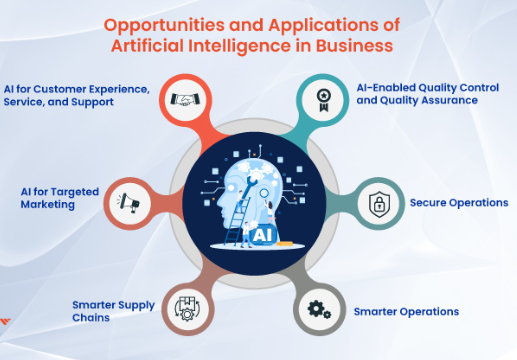
AI-driven Tools and Technologies for Business Operations
The digital era has ushered in a multitude of AI-driven tools and technologies, each designed to solve specific business challenges. From enhancing customer experiences to streamlining back-office operations, the versatility of AI tools is remarkable.
Exploring five essential AI-driven tools, as emphasized by Tufts Global Business, we see how these innovations are not just reshaping the landscape of business operations but also transforming customer engagement and big data management across industries
AI Tools in Business Operations: 5 AI-Powered Tools
AI technologies are no longer the future; they are the present, actively transforming the way businesses operate. Whether it's through automating routine tasks or providing deep insights into customer behavior, AI tools offer a competitive edge that is hard to ignore. But what makes these tools stand out? Their ability to learn and adapt over time provides increasingly accurate results and efficiencies.
1. Salesforce Einstein: At the forefront of CRM innovation, Salesforce Einstein harnesses the power of AI to predict customer behavior, automate responses, and personalize marketing efforts. It's a game-changer for businesses looking to enhance their customer relationship management.
2. IBM Watson: This suite of enterprise-ready AI services, tools, and applications tackles complex problems through robust data analysis. From healthcare to finance, IBM Watson's AI capabilities help businesses make informed decisions and uncover hidden insights.
3. Google Cloud AI: Offering both pre-trained models and the ability to create custom models, Google Cloud AI democratizes AI technology, allowing businesses of all sizes to leverage machine learning for analyzing data and enhancing operational efficiency.
4. Microsoft Azure AI: With a comprehensive set of AI services, Azure AI enables businesses to build sophisticated AI solutions that include digital agents, natural language processing, and advanced analytics, significantly reducing the time to market for innovations.
5. UiPath: Leading the charge in robotic process automation (RPA), UiPath automates mundane tasks, freeing up human resources for more strategic initiatives. It exemplifies how RPA, combined with AI, can streamline operations across various business functions.
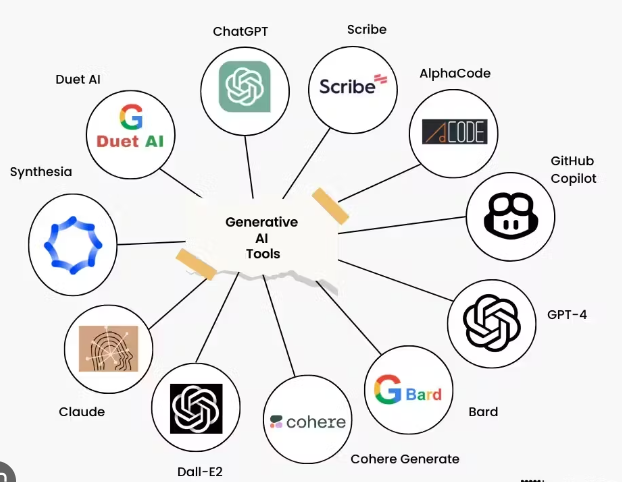
Applications of AI Tools in Business
The applications of these AI tools are as diverse as the tools themselves. Salesforce Einstein, for instance, can revolutionize customer service by automating responses and personalizing communication. Meanwhile, IBM Watson's deep data analysis capabilities can help identify market trends and inform strategic decisions.
Companies like SaaS Design and AI Design Agency are excellent examples of how AI tools can be utilized to enhance product design and user experience, showcasing the practical benefits of integrating AI into business operations.
These AI-driven tools not only offer the promise of increased operational efficiency but also open up new avenues for innovation and growth. By adopting these technologies, businesses can stay ahead in the fast-paced digital landscape, meeting their customer's needs more effectively and carving out a competitive edge in their respective industries.
Incorporating AI into business operations is not just about automating tasks; it's about reimagining how business is done. With these tools at their disposal, businesses have the opportunity to enhance decision-making, optimize processes, and deliver exceptional customer experiences. As we move forward, the role of AI in business operations will only grow, making it an indispensable part of the modern business toolkit.
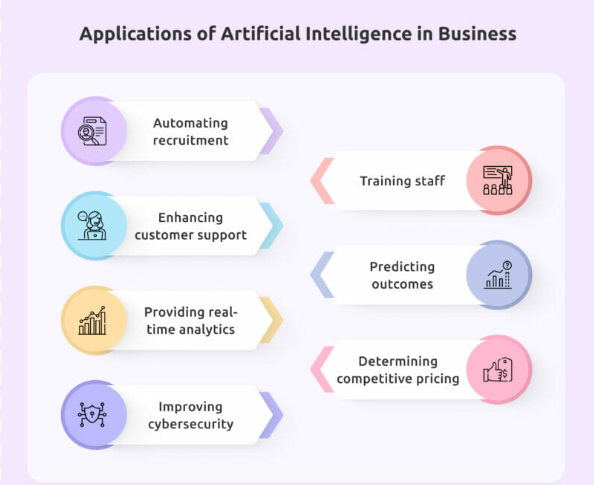
Case Studies of Businesses Leveraging AI for Operational Improvements
Artificial Intelligence (AI) stands out in today's rapidly advancing landscape of business technology for both its innovation and ability to revolutionize industries. AI's implementation in business operations has brought significant improvements in efficiency, productivity, and customer satisfaction - to illustrate this impact, we will look at some inspiring case studies of how businesses have taken advantage of AI for operational improvements.
Case Study 1: Enhancing Retail Operations with AI
Reflecting on Business News Daily's discussion on AI in CRM systems, a retail giant overcame inventory management and customer service challenges by leveraging AI, transforming their CRM system into a self-updating, auto-correcting entity that kept them ahead in customer relationship management.
By integrating machine learning algorithms into their inventory system, they were able to predict stock levels more accurately, thus decreasing overstock and understock situations significantly. This optimized supply chains while increasing customer satisfaction as products became more readily available to them.
Further, they implemented AI-powered chatbots on both their website and mobile app to provide instant customer service response times while handling inquiries and complaints efficiently - leading to improved response rates and an increase in positive customer reviews.
Case Study 2: Utilizing AI to Simplify Healthcare Operations
Healthcare provider employs AI to enhance both patient care and operational efficiencies. Their AI system was capable of analyzing patient data to predict health risks and recommend preventive measures, enabling early intervention that significantly improved outcomes and reduced healthcare facility burden.
By employing AI-driven scheduling tools, the provider was able to optimize appointment bookings while decreasing wait times and improving patient experiences. Not only was this AI implementation beneficial to operational efficiency; but also contributed significantly towards higher levels of patient trust.
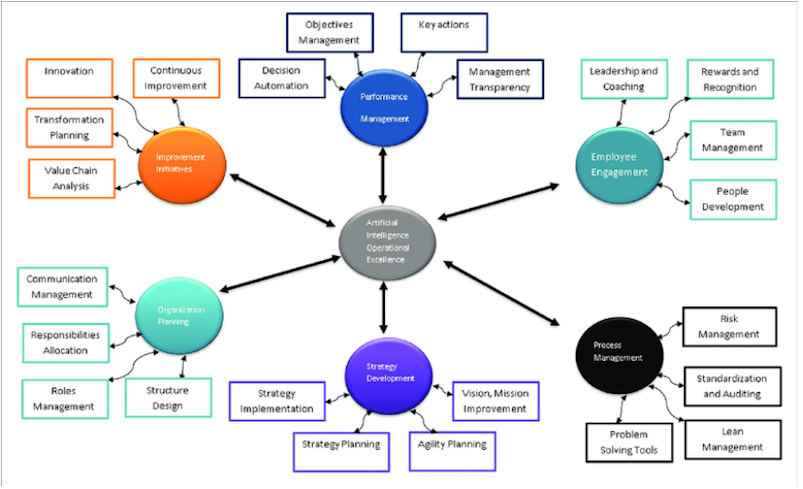
Designing Educational Technology with AI Impact in Mind
Educational technology has also seen marked advancements with AI integration. For an in-depth view of how this revolution is altering learning experiences and administrative efficiencies, read this eye-opening article EdTech for insightful observations. From personalized learning paths powered by AI to automated administrative tasks, AI in education is having an immense impact, making learning accessible and effective across global classrooms.
These case studies highlight the transformative power of AI across various sectors. By harnessing it, businesses can achieve operational excellence while opening the way to innovation and sustainable growth. AI continues to open new horizons for global business operations - these examples serve only as examples!
Integrating AI into Your Business Operations
Integrating AI technologies into your business operations can be both exciting and daunting, necessitating a strategic approach, an understanding of your needs, and an awareness of potential obstacles.
This section presents practical steps businesses of all sizes can follow to adopt AI technologies successfully and highlights key considerations to ensure successful implementation.
Practical Steps for AI Integration
1. Assess Business Needs and Opportunities: Assess your current operations to identify areas where artificial intelligence (AI) could provide maximum benefit, such as customer service, supply chain management, data analysis, or any other aspect that requires improvement. This could include customer service, supply chain management, or any other need.
2. Select Appropriate AI Tools: Based on the identified needs, research and select AI tools that best meet your business requirements in terms of scalability, ease of integration, and support services.
3. Pilot Projects: Embracing McKinsey & Company's guidance, start small with AI integration through pilot projects. This approach not only assesses AI's impact and navigates potential challenges but also steers clear of overwhelming your team, ensuring a smooth transition into AI-enhanced operation
4. Upskill Your Team: AI integration involves more than technology alone - it also relies on people. Invest in training programs designed to upskill your team with the knowledge and abilities needed for working effectively with any new AI tools that come into your workplace.
5. Evaluate and Scale: Assess the performance of AI implementations regularly by gathering feedback from stakeholders, using this insight to refine your approach and expand AI solutions across other areas of your business.
Challenges and Considerations Development Services
Data Privacy and Security: Implementing AI often involves handling sensitive information. Ensure compliance with data protection regulations and implement effective safeguards to secure it.
Ethical Considerations: AI should be utilized responsibly, with consideration given to its ethical ramifications when making decisions related to customer data analysis or employee monitoring.
Integration With Existing Systems: Integrating AI tools seamlessly with existing systems is vital for their successful deployment. Anticipate potential technical obstacles and ensure compatibility with your current infrastructure to maximize success.
Businesses looking for guidance in AI implementation can gain invaluable insights by exploring resources such as UX Design Services. Furthermore, exploring AI Startups could offer some invaluable advice from companies at the forefront of innovation within this space.
Integrating AI into business operations offers businesses an avenue for improved efficiency, innovation, and competitiveness. Although challenges exist with AI adoption, taking a thoughtful and strategic approach to its adoption can open new potentials while driving significant operational improvements. As AI technologies advance, remaining informed and adaptive will be key in unlocking all its potential in an ever-evolving business landscape.
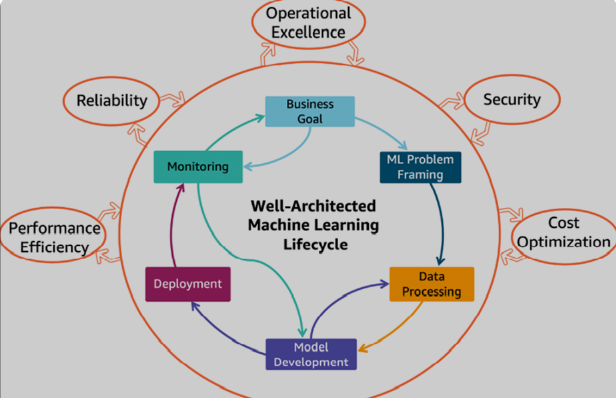
Concluding Thoughts on AI in Business Operations
As we embrace the digital era, Artificial Intelligence AI stands at the forefront of transforming business operations, blending excellence with innovation to redefine operational success. AI's capability to analyze, predict, and automate opens doors to unprecedented efficiency and strategic foresight. Companies leveraging AI, like Salesforce Einstein, IBM Watson, and Google Cloud AI, attest to its power in refining supply chains and elevating customer experiences.
Yet, integrating AI into business operations transcend mere technology adoption. It demands a deliberate strategy that includes assessing needs, choosing appropriate tools, piloting projects, and enhancing team skills while addressing data privacy and ethical challenges. The horizon for AI in business operations stretches beyond automating mundane tasks; it promises a future where AI fuels insight, creativity, and competitive edge.
Navigating the intricacies of AI integration is vital for businesses aiming to thrive in the digital age. At Adam Fard, we thrive in designing human-centric digital experiences and offer unmatched expertise in incorporating AI into business strategies. This ensures that enterprises not only adapt to technological changes but also lead in innovation. Are you a startup founder or CEO looking to leverage AI for growth and innovation? Book a free consultation with us today.


